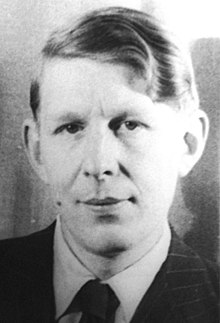Wystan Hugh Auden
| W. H. Auden | |
|---|---|

Auden in 1939
|
|
| Born |
Wystan Hugh Auden 21 February 1907 York, England |
| Died | 29 September 1973 (aged 66) Vienna, Austria |
| Residence | York, Birmingham, Oxford (UK); Berlin (Germany); Helensburgh, Colwall, London (UK); New York, Ann Arbor, Swarthmore (US); Ischia (Italy); Kirchstetten (Austria); Oxford (UK) |
| Citizenship | British from birth, American from 1946 |
| Education | M.A. English language and literature |
| Alma mater | Christ Church, Oxford |
| Occupation | Poet |
| Spouse(s) | Erika Mann (unconsummated marriage, 1935, to provide her with a British passport) |
| Relatives | George Augustus Auden (father), Constance Rosalie Bicknell Auden (mother), George Bernard Auden (brother), John Bicknell Auden (brother) |
Wystan Hugh Auden (/ˈwɪstən ˈhjuː ˈɔːdən/; 21 February 1907 – 29 September 1973) was an English-American poet. Auden's poetry was noted for its stylistic and technical achievement, its engagement with politics, morals, love, and religion, and its variety in tone, form and content. He is best known for love poems such as "Funeral Blues", poems on political and social themes such as "September 1, 1939" and "The Shield of Achilles", poems on cultural and psychological themes such as The Age of Anxiety, and poems on religious themes such as "For the Time Being" and "Horae Canonicae."
He was born in York, grew up in and near Birmingham in a professional middle-class family. He attended English independent (or public) schools and studied English at Christ Church, Oxford. After a few months in Berlin in 1928–29 he spent five years (1930–35) teaching in English public schools, then travelled to Iceland and China in order to write books about his journeys.
In 1939 he moved to the United States and became an American citizen in 1946. He taught from 1941 to 1945 in American universities, followed by occasional visiting professorships in the 1950s. From 1947 to 1957 he wintered in New York and summered in Ischia; from 1958 until the end of his life he wintered in New York (in Oxford in 1972–73) and summered in Kirchstetten, Lower Austria.
...
Wikipedia
